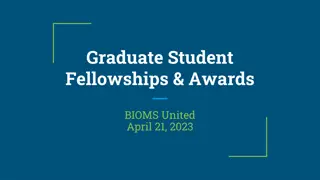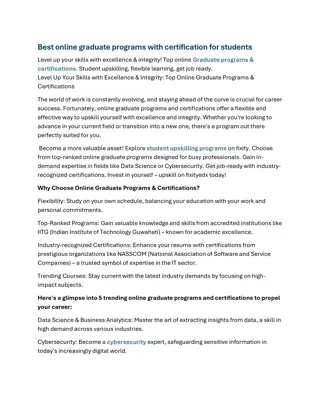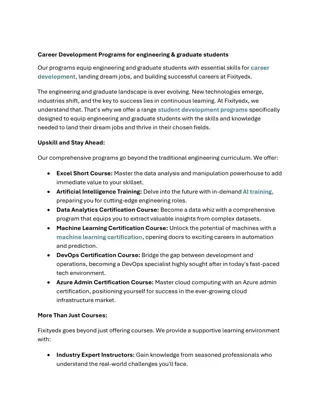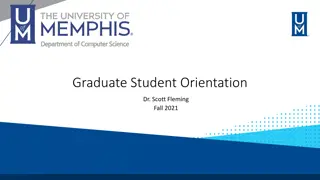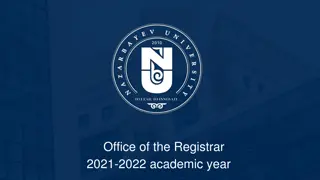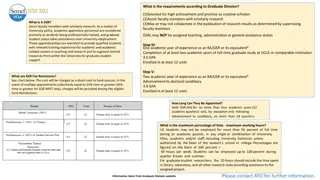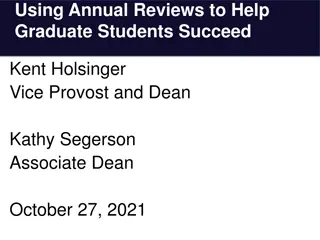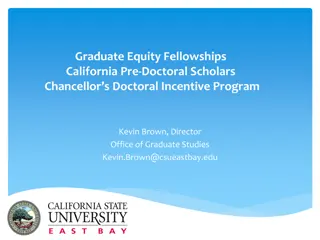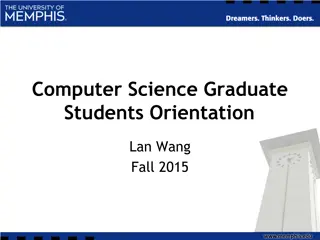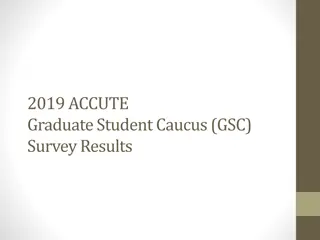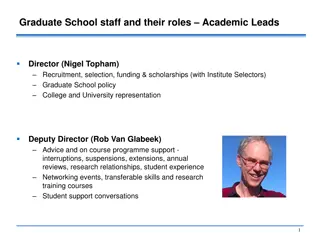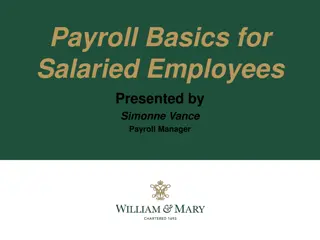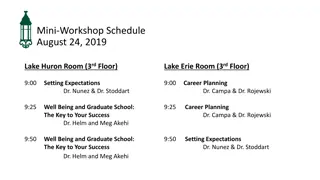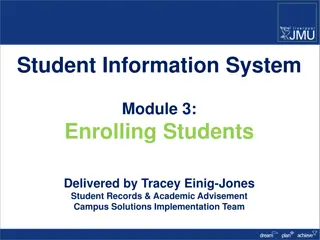
Graduate Student Employment and Assistantships at UNT
Learn about graduate student processes, employment definitions, types of assistantships, and job codes at University of North Texas (UNT). Understand the opportunities available for financial support and valuable work experience during graduate studies.
Download Presentation

Please find below an Image/Link to download the presentation.
The content on the website is provided AS IS for your information and personal use only. It may not be sold, licensed, or shared on other websites without obtaining consent from the author. If you encounter any issues during the download, it is possible that the publisher has removed the file from their server.
You are allowed to download the files provided on this website for personal or commercial use, subject to the condition that they are used lawfully. All files are the property of their respective owners.
The content on the website is provided AS IS for your information and personal use only. It may not be sold, licensed, or shared on other websites without obtaining consent from the author.
E N D
Presentation Transcript
Salaried Graduate Student Processes Presented by Academic Resources Hurley Administration Building, Suite 370 940-565-2550 academic.resources@unt.edu
Graduate Employment Graduate students are defined by the Texas Higher Education Coordinating Board as Any student who is pursuing a program, or has a bachelor's degree and is enrolled in courses which are normally part of a program, leading to a graduate or professional degree or certificate at an institution of higher education and has successfully completed the equivalent of at least three years of full-time study at an institution of higher education either prior to entrance into the program or as part of the program itself.
Assistantships An assistantship is offered by a department to provide financial support to a student who is pursuing graduate studies and who agrees to enter into an employment relationship with the university. The university has four types of assistantships (defined on next slide). The salary received is considered employment income and is subject to employment- related taxes. Students on assistantships for at least .5 FTE are eligible to participate in the State s Uniform Group Insurance Plan (UGIP), which is administered by the Employee Retirement System (ERS) of Texas. However, in lieu of participating in the State s UGIP insurance plan, they may participate in the university s Student Insurance Plan, which is administered by UnitedHealthcare Student Resources. Student insurance costs will vary depending on the plan and the level of coverage selected in either plan. Please note that foreign national students must comply with any specific FTE restrictions that may be in place regarding their particular work authorization.
Types of Assistantships/Job Codes Teaching Fellow (TF)- Job Codes 0801, 0802, 0803- Teaching fellows have direct student contact in a formal instructional setting and are charged with primary responsibility for teaching a course for credit under the direct supervision of a faculty member or chair, receiving regular in-service training and planned and periodic evaluations. Teaching Assistant (TA)-Job Codes 0811, 0812, 0813 - Teaching assistants are graduate students who do not have primary responsibility for teaching a course for credit; they perform under the instructor s direct supervision and provide general assistance to the instructional process, such as grading, tutoring, etc. Teaching assistants may not be listed as instructor of record. Research Assistant (RA) - Job Codes 0821, 0822, 0823 - Research assistants are graduate students who are engaged in research activities under the direction and supervision of a principal investigator or faculty working on research. Graduate Services Assistant (GSA) Job Codes 0831, 0832, 0833- Graduate assistants are graduate students whose responsibilities are administrative in nature or consist of other activities that do not generally fit within the TF, TA, or RA job responsibilities, but contribute to the overall academic progress or professional development of the student.
Account Coding for Job Codes 0801 0813 TA and TF jobs codes will post to Account 50127 (D5012) 0821 0823 RA job codes will post to Account 50165 (D5016) 0831 0833 GSA job codes will post to Account 50167 (D5016) Typically for academic areas, these jobs will be paid under fund codes 105 or 200 and fund category 800001, 805001, 830001, or 880001. Depending on the type of funding your college has for these types of jobs, however, they can be funded from other sources, particularly RA s on sponsored research.
Compensation Plan A Graduate Student Pay Schedule has been created to ensure graduate students have proper financial support. Students must maintain good academic standing while on an assistantship in order to continue receiving university support. The current version of the pay plan is located on the Academic Resources website: https://vpaa.unt.edu/resources/retention
Pay Schedule The rates in the pay schedule were determined based on three factors: 1. The academic progression level of the graduate student 2. The academic department for which the student is employed or the academic department that closely aligns to a non-academic department for which the student is employed. 3. Provision for status as a research assistant is provided. The default department rate that will be used for non-academic departments will be that in which the Higher Education program resides unless justification is provided to use another academic department s rate. Summer monthly rates are equivalent to the monthly rates provided during the regular academic year.
Pay Schedule Progression to the next level requires meeting the minimum qualifications of the higher level at the beginning of the Fall semester only. Upon the initial hire of a graduate student, the entry level salary will generally be at the minimum rate based on the qualifications outlined below. However, a College, School or Division may elect to hire individuals above the entry level salary based on internally developed criteria. Hire above entry does not require approval by the Office of the Provost and Vice President for Academic Affairs. Hires at or above midpoint require the submission of a justification statement explaining why the higher rate is being requested. All salaries must be funded by the college, school, or division. Graduate students may receive annual pay increases if warranted and recommended by the department head or the department chair and dean if financial resources are available. However, under no circumstances should a graduate student exceed the maximum salary at the level in which they are situated.
Qualifications Academic Progression Level 1: Masters or doctoral students without experience in a graduate degree program and with less than 18 credits toward a graduate degree. Academic Progression Level 2: Students pursuing a master s degree or seeking a doctoral degree with at least 18 credits toward a graduate degree. This is the entry level for doctoral students with an earned master s degree. Academic Progression Level 3: Doctoral or MFA students who have completed all course work; have passed all their qualifying examinations; and are in good academic standing. Exceptions must be approved by the Graduate School. For advancement to Pay Level 3, departments must fill out a brief form to certify results of qualifying examinations at: https://tsgs.unt.edu/sites/default/files/u63/qualifying-examination-results.pdf
Length of Appointment Doctoral students on state-funded UNT assistantships are eligible for funding for no more than 12 long, academic semesters, regardless of whether students work at any time at .5 or .25 FTE. Students who file an approved request for a leave of absence will not have months spent on leave counted against these limits. Time spent on externally funded grants will not be counted against these limits. Master s students on state-funded UNT assistantships or locally funded accounts are eligible for funding for no more than 6 long, academic semesters, regardless of whether students work at any time at .5 or .25 FTE. Students who file an approved request for a leave of absence will not have months spent on leave counted against these limits. Time spent on locally funded accounts or externally funded grants will not be counted against these limits. For MFA students, semester time limits will be determined by the number of required SCH in the degree program divided by 6. For example, students in a 48 hour MFA program would be eligible for 8 semesters of funding (48 6).
Allocation of Graduate Student Lines/Positions POSITIONS: Each College and school receives an allocation of centrally-funded, graduate student assistantship lines/positions. Colleges and schools shall allocate positions to the departments. Each position is .25 FTE. Each year the colleges and schools will have an opportunity to make changes to the positions allocated based on changed qualifications of the students, changing needs of their departments, and/or other relevant reasons. APPOINTMENTS: Graduate students paid from local/grant funds (not centrally-funded) will not be placed in lines/positions but will be paid on an appointment. Also, departments can use central funds, if available, to create appointments in excess of their allocated positions. Students supported from local/grant funds must be paid at the rates specified in the UNT Graduate Student Pay Schedule.
Applicable Policies 06.043 Graduate Fellowship/Research Assistantship Load Specifications https://policy.unt.edu/sites/default/files/06.043_GradFellowResearchAss_2018pub_0.pdf Graduate students who hold a research assistantship or graduate services assistant of half-time (20 hours per week) or greater, or other appointment designed for the support of graduate study, must be enrolled in a minimum of nine (9) semester credit hours (SCHs) during long semesters. These minimums apply to positions supported by state, federal, and private sources of funds. Academic units may set higher requirements. A load greater than 12 SCHs must be approved in advance by the appropriate college/school dean or their designee and the vice provost for graduate education and dean of the Toulouse Graduate School or their designee. Academic Resources in conjunction with TGS will audit enrollment each long semester.
Applicable Policies 06.020 Recruitment & Selection of Teaching Fellows & Teaching Assistants https://policy.unt.edu/sites/default/files/06.020_RecruitmentandSelectionTFsandTAs.pub2018.pdf Points to Remember: TFs have primary responsibility for teaching a course and/or for assigning final course grades for such a course. Teaching fellows are listed as the instructor of record. For credentialing purposes, a CV and transcript must be on file. A minimum of 18 graduate credit hours directly related to the course(s) to be taught are required to teach undergraduate level courses (does not include cross-listed courses). The minimal academic workload for TF/TAs in any long semester is nine (9) graduate SCHs. Upon written recommendation of the college/school dean or the dean s designee, the nine (9) SCH limit may be reduced to three 3) SCHs for the long semester for students who: (a)have completed an approved degree plan, (b) have completed all course work, and (c) are either ready to take the qualifying examination and/or registered for thesis/dissertation. Exceptions must be approved by the Vice Provost for Graduate Education and Dean of the Toulouse Graduate School Academic Resources in conjunction with TGS will audit enrollment each long semester.
Workload To ensure compliance with the Affordable Care Act and UNT Policy, salaried graduate students will be limited to a combined .5 FTE (20 hours per week).
Offer Letters Departments will submit offer letters for all newly hired salaried graduate students being hired by using the automated form located on our website: https://vpaa.unt.edu/resources/retention Offer letters can be issued for an entire academic year, to include summer, if desired. Fall Offer letters due to Academic Resources 1st business day of August Spring Offer letters due to Academic Resources 1st business day of December Summer Offer letters due to Academic Resources 1st business day of May Academic Resources will respond to confirm receipt of the offer letter and if a CHC is needed; if needed, CHC will be ordered accordingly (see next slide). Departments may, if desired, use the Salaried Graduate Student Offer Letter Template to draft and send to all their returning salaried graduate students. Letters should be issued from and returned to the department. For returning students Letters are not required but can be done at the discretion of the department. The offer template is located on the website listed above.
Criminal History Check Process A process for criminal history checks on salaried graduate students became effective in October of 2019. Some of the highlights of this procedure include: Departments will submit signed offer letters to Academic.Resources@unt.edu utilizing the dynamic form process ( https://vpaa.unt.edu/resources/retention ). Academic Resources will respond confirming offer letter received and will let department know if CHC is needed. If CHC is required, Academic Resources will initiate the request to Accurate. Accurate will email the student invitation to complete CHC request online. Student will complete CHC request online. Accurate will run the CHC and report the results back to Academic Resources. Academic Resources will forward results to the department contact. Department will submit ePAR. NOTE: Onboarding and Form I-9 s are handled by the Career Center. Please contact Student.Employment@unt.edu to schedule an appointment or to request information.
Criminal History Check Process Departments should inform their graduate students to expect a criminal history check if one is required. An email request from Accurate Background, Inc. will be sent to the preferred email listed on the on the offer letter. As requests are valid for one week only, students will need to complete and submit this request as soon as possible.
Effective Dates for Appointments/Positions Standard dates include Fall: 9-1-XX with an appointment end date of 1-16-XX Spring: 1-16-XX with an appointment end date of 5-31-XX To place on appointment for both fall and spring, use 9-1-XX with an appointment end date of 5-31-XX Dates for TA s and TF s must be tied to the academic session in which they are working. The dates on the Academic Session Payroll Dates chart must be followed. Fall appointments cannot begin prior to 9-1-XX Spring appointments cannot extend past 5-31-XX Summer appointments must be separate and dated between 6-1-XX and 8-31-XX
Behind the Scenes Processes August- FY (fiscal year) rollover for September 1st Spreadsheets submitted by academic departments and loaded by ITSS Appropriate/separate instructions sent at that time December- Spreadsheets sent out for reference Used for reference and verification of current status only Mass Short WorkBreak Termination Process Twice yearly, September and January Eliminates unnecessary active records Keeps unnecessary benefit premiums to ERS at a minimum o o o
Helpful Hints: https://vpaa.unt.edu/resources/retention Academic Resources Contacts Faculty, Graduate Student and Adjunct appointments and positions: ext 3512 (Salaried Grad ePAR s and Criminal History Checks) Chance McMillan chance.mcmillan@unt.edu, ext 2138 (Adjuncts) Brandi Everett- brandi.everett@unt.edu, ext. 3951 (New & Existing Faculty) ext 2693 (New Faculty onboarding and records) Tami Patterson tami.patterson@unt.edu, ext. 3953 (Summer Faculty appointments, Staff, additional pay items)


